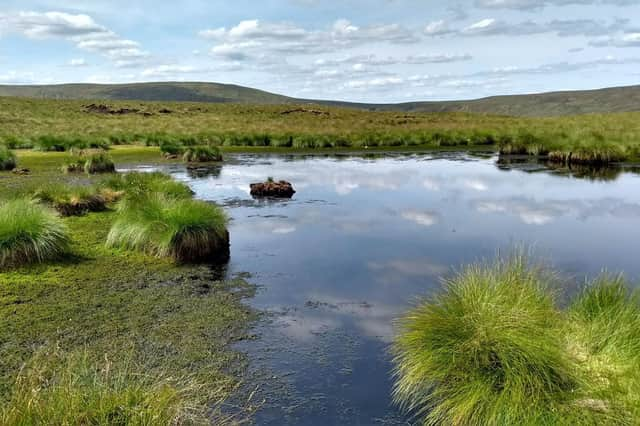Restoration work on almost 40 per cent of Yorkshire's peatlands hailed in climate change fight


A report published by the Yorkshire Peat Partnership on its activities between April 2020 and March 2021 noted that 36,574 hectares of peak restoration work has been completed across the region – representing 38 per cent of the 95,796 hectares of blanket bog in Yorkshire.
The Yorkshire Peat Partnership began in 2009 as an umbrella organisation led by the Yorkshire Wildlife Trust. Its aim was to try and coordinate the restoration of the badly degraded blanket bog of northern Yorkshire which was damaged in the 1950s and 1960s as the Government incentivised landowners to drain the land for “agricultural improvement”.
Advertisement
Hide AdAdvertisement
Hide AdBut it is now understood that blanket bog, which is upland peatland habitat, stores carbon and also helps to slow the flow of water from the uplands into rivers and streams, filters drinking water and provides habitat for wildlife.
Restoration work involves replanting peatlands with native bog vegetation which stabilises the peat and protects it from erosion and the creation of wet conditions that allow important food species like cranefly to thrive, supporting the food web.
Yorkshire Wildlife Trust’s Peat Programme Manager, Dr Tim Thom said: “Blanket bog covers around 96,000 hectares in North Yorkshire – our restoration work is making so much space for nature to survive and thrive.
"Ecosystem services are an important consideration but when we discuss wild places purely in terms of the benefits they afford us, we diminish them. Our beautiful Yorkshire blanket bogs are worth looking after.”
Advertisement
Hide AdAdvertisement
Hide AdGlobal Peatlands Initiative coordinator Dianna Kopansky added: “It is wonderful to see peatlands being recognised and valued for all the roles they play as a holistic ecosystem.
“This work by YPP to restore Yorkshire’s blanket bogs is so important not just for Yorkshire, but in developing and demonstrating restoration techniques and best practice that can be used across geographies.”
The report explains: “The UK has 13 per cent of the world’s blanket bog, and we estimate Yorkshire holds around 95,796 ha – around 26 per cent of England’s total resource – storing over 47 million tonnes of carbon. In addition to locking up millennia of carbon, healthy blanket bog helps to slow the flow of water from the uplands into rivers and streams, filters our drinking water and provides habitat for some amazing wildlife. Formed over thousands of years, it has taken just six decades to devastate Yorkshire’s peatlands.
“Most damage occurred between the 1950s and 1980s, when the government incentivised landowners to drain the land for ‘agricultural improvement’. Drainage channels – known as grips – were dug across vast tracts of blanket bog, which still criss-cross the landscape today. 80 per cent of our blanket blog has been damaged in this way, leaving our peatlands brown and broken. We aim to restore this amazing habitat to fully functioning blanket bog that benefits both people and wildlife.”
Advertisement
Hide AdAdvertisement
Hide AdIn July, new peatland projects were announced to help the UK reach its net zero target by 2050. The Yorkshire Peat Partnership is to work with other northern projects to bring more than 4,000 hectares of upland peatland under restoration management, with estimated annual CO2 savings of at least 8,590 tonnes per hectare, per year.
Read more:
Support The Yorkshire Post and become a subscriber today. Your subscription will help us to continue to bring quality news to the people of Yorkshire. In return, you'll see fewer ads on site, get free access to our app and receive exclusive members-only offers. Click here to subscribe.